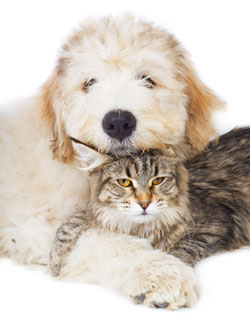Dog and cat registration fees
 Registration fees are set by your local council, and vary depending on a number of factors. Contact your council to find out which fees apply to your pet.
Registration fees are set by your local council, and vary depending on a number of factors. Contact your council to find out which fees apply to your pet.
You are eligible for reduced registration fees if your pet is:
- De-sexed
- Has an obedience certificate issued by a Government approved organisation
- Over 10 years of age
- Kept for working stock
- Kept for breeding by the proprietor of a registered domestic animal business
- A hound registered with the GMA that is microchipped.
You also get reduced registration fees if your pet is registered with an applicable organisation approved by the Minister.
Pensioners who have approved concession cards issued by the Department of Social Services and Department of Veterans Affairs are also entitled to a reduction in their fees.
Registered foster carers get a significantly reduced registration fee.
Applicable organisations are:
- Australian National Cats Inc.
- Dogs Victoria
- Feline Control Council (Victoria) Inc.
- The Governing Council of the Cat Fancy Australia and Victoria Inc
- Master Dog Breeders & Associates
- Responsible Pet Breeders Australia.
Renew your pet’s registration each year
Don't forget to renew your pet's registration each year by 10 April.
Moving home
If you move to a new council area, make sure you transfer your pet's registration. Often, when you transfer registration your new local council will only charge you a percentage of the year's registration, because of the fees you have already paid. Also, remember to update your contact details with your microchip registry — this is a separate task to updating your pet registration records with your local council.
Lost pet tags
If your pet loses its identification marker (which must always be worn by your pet when outside your premises), you can get a new one from your local council.
Cat and dog registration statistics
Year | Dog registrations | Cat registrations |
|---|---|---|
| 2025 | 629,689 | 221,557 |
| 2024 | 634,233 | 218,575 |
| 2023 | 651,551 | 224,382 |
| 2022 | 660,134 | 227,127 |
| 2021 | 654,289 | 225,399 |
| 2020 | 632,006 | 210,213 |
| 2019 | 662,855 | 221,548 |
| 2018 | 651,631 | 214,223 |
| 2017 | 668,525 | 216,448 |
| 2016 | 671,293 | 215,017 |
| 2015 | 680,994 | 215,265 |
| 2014 | 673,039 | 212,664 |
| 2013 | 679,564 | 216,141 |
| 2012 | 684,778 | 216,461 |
Owning multiple pets
Owning multiple pets is a greater responsibility for any member of the community. All of your dogs and cats must be registered individually with your local council.
Some local councils require permits for residents to keep more than a particular number of dogs and cats on their property. This helps to ensure the welfare of pets.
It is important that:
- they are kept in a healthy environment
- neighbours are not inconvenienced by pets.
Maximum numbers of pets per household are set by your council and vary across the state.
It is important to register all your pets. If you do not have a permit for excess animals, council can take further action.
Further information
Read the Domestic Animals Act 1994 as well as a range of other relevant information that can be downloaded from:
For further information, please phone the Customer Service Centre on 136 186.